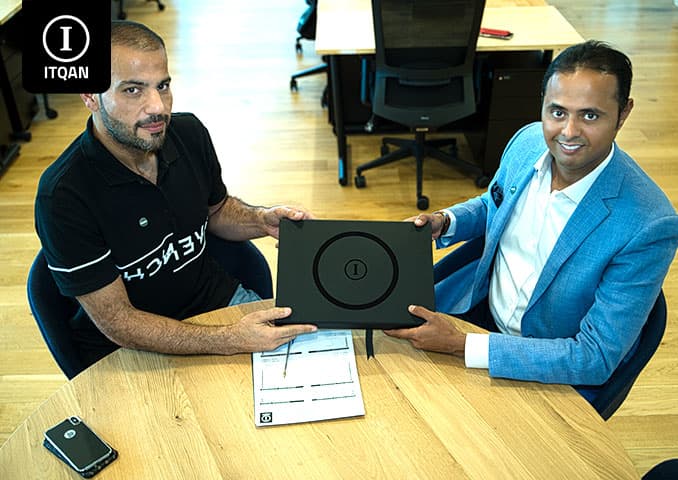How to set up a business in Dubai? Dubai is one of the most prominent global destinations for investment and business establishment, thanks to its dynamic economic environment and advanced infrastructure. Dubai attracts investors and entrepreneurs from all over the world thanks to its strategic location as a link between the East and the West, in addition to the flexible legal frameworks and economic incentives it provides. Dubai offers a suitable business environment that combines government facilities, diverse investment opportunities, and qualified human resources, making it an ideal choice for establishing companies and growth. In this article, we will review the steps for setting up a business in Dubai , from choosing the appropriate business activities to dealing with government agencies, with a focus on how to benefit from the services of specialized companies such as “Atqan” to facilitate this process.

جدول المحتوى
ToggleProcedures for establishing a business in Dubai
Establishing a company in Dubai requires following a series of basic procedures that ensure your company complies with legal and administrative requirements. Here are the main steps to establish a business in Dubai:
- Choosing the business activity: Determine the type of business activity you wish to practice, as this choice varies according to the type of activity (commercial, industrial, service, etc.) and affects the type of license you will need.
- Determine the location of your business: Choose a location for your business, either in a free zone or within Dubai. Free zones offer special benefits such as 100% foreign ownership and customs exemptions, while areas within Dubai may require a local partner.
- Choosing a company name: Choose a trade name for your company, make sure it meets legal requirements, and avoid prohibited names.
- Apply for a license: Depending on the type of your activity, apply for the appropriate license (commercial, industrial, professional, etc.) from the Dubai Department of Economic Development or the responsible authority in the free zone.
- Preparing legal documents: Prepare and collect the required documents, such as the articles of incorporation, application form, founders’ ID cards, and proofs of address.
- Office Lease: Obtain a lease for an office or workspace that meets licensing requirements.
- Open a bank account: Open a business bank account in the company’s name.
- Obtaining Work Visas: Apply for work visas for employees if required.
- Company registration: Register your company in the commercial records of the relevant authorities, and obtain the commercial number.
- Comply with local laws: Ensure compliance with all local laws and regulations regarding taxes and social security.
- Launching your business: After completing all the procedures and obtaining the license, you can officially start your business.
- It is best to cooperate with specialized consulting companies such as “Atqan” that can help you expedite the procedures and ensure full compliance with legal requirements.
Advantages of establishing a business in Dubai
Establishing a company in Dubai offers many advantages that make it an attractive destination for investors and entrepreneurs. Here are some of the most prominent of these advantages:
- Convenient Business Environment: Dubai offers a superior business environment thanks to its modern infrastructure and advanced logistics services, making it easy to conduct business and exchange trade.
- Full ownership of the company: In free zones, foreign investors can own the company 100% without the need for a local partner.
- Tax exemptions: Dubai offers attractive tax exemptions, including no corporate income tax on most business activities.
- Simplified registration procedures: Dubai offers quick and efficient company formation procedures, reducing the time and cost required to start a business.
- Strategic location: Dubai is a global trading hub linking European, Asian and African markets, enhancing access to new markets.
- Diversified and sustainable economy: Dubai has a diversified economy, which includes multiple sectors such as trade, tourism, technology, and real estate, providing multiple opportunities for investors.
- Advanced infrastructure: Dubai offers world-class infrastructure including modern airports, seaports, and advanced transportation networks that support business activities.
- Flexible regulatory procedures: Dubai offers a flexible regulatory environment that supports innovation and encourages entrepreneurship, which contributes to facilitating the start-up and development of businesses.
- Diverse financing opportunities: Investors can obtain financing through a range of options including local banks and investment companies.
- Additional incentives and benefits: Dubai offers various incentives such as support for start-ups, business development programmes, and discounts on customs duties in free zones.
- These advantages make Dubai an ideal environment for investors and entrepreneurs looking to achieve commercial success both locally and internationally.
Company formation in Dubai
Setting up a company in Dubai is a smart strategic move for many global entrepreneurs and investors, thanks to the advanced business environment the city offers. The process begins with identifying the type of business activity and choosing the right location, whether it is in a free zone where foreign investors can fully own the company, or in commercial areas within the city that may require a local partner. Next, a trade name must be chosen that complies with the legal requirements and an application must be submitted for the appropriate license from the Department of Economic Development or the responsible authority in the free zone.
One of the notable advantages of setting up a company in Dubai is the exemption from corporate income tax, which helps boost profitability. Dubai also offers advanced infrastructure and integrated logistics services, which facilitates the movement of business and trade. Company registration procedures are fast and efficient, reducing the time required to start a business. Moreover, the city offers ample opportunities to access new markets, thanks to its strategic location as a global business hub. Thanks to these factors, Dubai is an ideal destination to set up a business and achieve success in a thriving business environment.
Documents required to establish a company in Dubai
To set up a company in Dubai , you will need to submit a set of basic documents. The required paperwork may vary slightly depending on the type of business and the location of incorporation (inside Dubai or in a free zone). In general, the required documents include:
- Establishment Application: Establishment application form which can be obtained from the Department of Economic Development or the responsible authority in the free zone.
- Articles of Association: An official document that specifies the details of the company, such as its type, partners, and ownership percentages, and is prepared by a licensed attorney.
- Identity certificates: A copy of the passports of the founders and shareholders, in addition to copies of the national identity cards.
- Personal Photos: Recent photos of founders and shareholders.
- Proof of address: Documents proving the founders’ residential address, such as a utility bill (electricity, water) or a rental agreement.
- Approval of relevant authorities: For some activities, you may require additional approvals from relevant government authorities.
- Power of Attorney or Agency: If there is a representative or attorney acting on behalf of the founders, an official power of attorney must be submitted.
- Office Lease Agreement: A lease or document that proves the acquisition of office space allocated to the company.
- Special Certificates: For some activities, you may need to provide special certificates or licenses related to the business.
- It is important to check the requirements for the type of activity and the specific location with the relevant authorities or to use a specialized consulting company to ensure that all necessary documents are submitted correctly.
Open a commercial register to establish a business in Dubai
Opening a commercial register to establish a business in Dubai requires following specific steps to ensure compliance with all legal requirements. Here are the main steps to open a commercial register:
- Select the business activity: Determine the type of activity you will be doing, as the type of commercial register varies based on the activity (commercial, industrial, professional, etc.).
- Choosing a trade name: Choose a trade name that complies with local laws and avoid prohibited names. You can check the availability of the name through the Dubai Department of Economic Development website.
- Submitting a registration application: Submit an application to open a commercial register through the Dubai Department of Economic Development website or through approved service centers. The application requires providing information about the type of activity, trade name, and office address.
- Prepare the required documents: Prepare and collect the necessary documents, which include the articles of association, passports of the founders, proof of address, and any additional documents related to the business activity.
- Document Review: The documents submitted will be reviewed by the department to ensure that all legal requirements are met.
- Paying the fees: After reviewing and approving the documents, pay the fees required to register the company. The fees vary depending on the type of activity and the size of the company.
- Obtaining a commercial registration: After paying the fees, you will receive a commercial registration certificate, which is evidence that your company is officially registered and has the right to practice business in Dubai.
- Obtaining a license: Depending on the type of activity, you may need to obtain an additional business license from the Department of Economic Development or the competent authority in the free zone.
- Open a bank account: Open a business bank account in the company’s name to ensure easy management of financial transactions.
- Employment Registration: If you are going to hire employees, you must register them and obtain work visas for them in accordance with local regulations.
- Establishing a commercial register in Dubai is an important step to start your business, and it is best to seek the help of a specialized consulting company to ensure that all procedures are completed with
Concluding our article on setting up a business in Dubai , it is clear that the city offers an ideal environment for investors and entrepreneurs thanks to its many encouraging advantages. By providing simplified registration procedures, tax exemptions, and advanced infrastructure, Dubai confirms its position as a preferred global destination for establishing and growing companies. Choosing Dubai as the location of your business allows you to access a wide global market and benefit from its strategic location as a major commercial hub. It is important to follow the correct legal steps and work with specialized consulting firms to ensure the success of the establishment process. With its strong support for innovation and trade, Dubai opens new doors for you to achieve your business goals and achieve success in the business world.
Frequently asked questions about starting a business in Dubai
Can foreigners fully own a company in Dubai?
Yes, foreigners can fully own a company in Dubai’s free zones. In business areas outside the free zones, a local partner with 51% of the shares may be required.
How long does it take to set up a company in Dubai?
The company formation process can take anywhere from several weeks to a few months, depending on the speed of preparation of the required documents and approvals.
Are there corporate taxes in Dubai?
Dubai offers extensive tax exemptions, including no corporate income tax on most business activities. However, it is important to check which taxes apply to specific activities.
Can I change the type of business activity after registering the company?
Yes, you can change the type of business activity, but this requires amending the license and renewing the relevant legal documents.

















